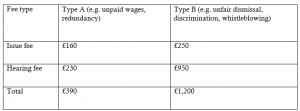Supreme Court delivers shock judgment on Employment Tribunal Fees
The judgment of the Supreme Court handed down in R (on the application of UNISON) v Lord Chancellor [2017] UKSC 51 on 26 July 2017 has been heralded as a masterpiece and is certainly a landmark decision and victory for UNISON members. Seven judges ruled unanimously that fees for Employment Tribunal claims, introduced in 2013, were unconstitutional and unlawful under both EU and UK law.
Employment Tribunal fees were introduced by the then Lord Chancellor, Chris Grayling, via a fees order (Employment Tribunals and the Employment Tribunal Appeal Tribunal Fees Order 2013, SI 2013/1893). There were two levels of fees for individual claims in the Employment Tribunal depending on the type of dispute. These were split into a fee for starting the claim and a fee for the hearing itself:

The rationale behind this was to reduce the number of very weak claims and to encourage early settlement. What actually happened was that there was an 80% reduction in the number of claims brought to the ET but the proportion of these that were successful did not increase significantly. (If the argument provided for introducing the fees was correct, the expectation was that that the percentage of successful cases would have increased dramatically). UNISON brought a case against the Government arguing that the introduction of the fees had prevented many people from getting access to justice – after all, if you have just lost your job, you are unlikely to be able to afford fees of £1,200 to take your employer to the Tribunal.
The Supreme Court agreed – stating that the fees order had the “practical effect of making it unaffordable for persons to exercise rights conferred on them by Parliament”.
The implications of the decision are huge and wide ranging. Initially, the charging of fees has been stopped and the Government will now be required to repay fees paid – the bill for which has been estimated at £32 million. How the repayments will work is unclear at this stage, but we will provide further information once the repayment scheme is published.
There are also more tricky questions to deal with. There will be claimants who have paid fees and not recovered them as they lost their case (fees can usually be recovered by the winning party, although costs for representation by solicitors and barrister cannot normally be). There will be employers who have had to pay the fees to the employees when they won their cases. Will the losing parties now seek to recover their fees from the litigant or the Tribunal? There is also the matter of individuals who can show that they did not make a claim because they could not afford it – will they be allowed to make a claim outside of the usual permitted timescales?
If you have been involved in an Employment Tribunal claim and wish to discuss this further, please contact Elaine O’Connor on 0207 940 4000 or at eoc@anthonygold.co.uk.
No comments